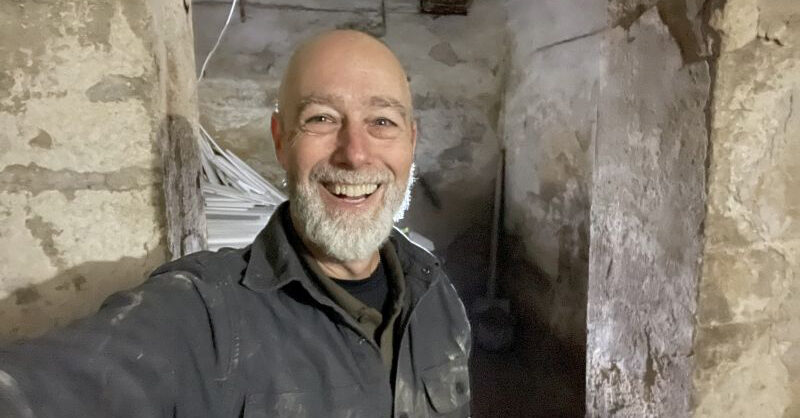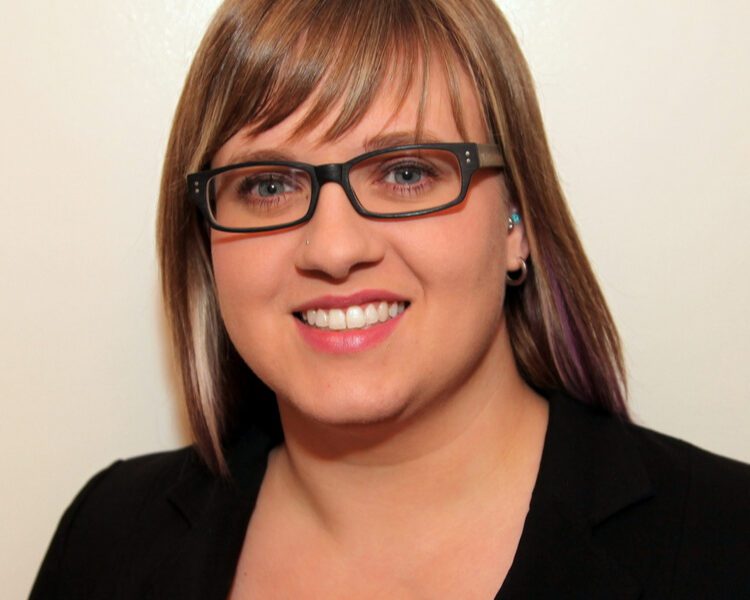It was a feeling more than a reason that compelled David Greco to pack his apartment into a storage unit and buy a one-way ticket to Kyiv, Ukraine last May. The memories of crouching beneath his elementary school desk during nuclear drills amid heightened tensions between the United States and the former Soviet Union flashed back to him. It was surreal for Greco that, in his lifetime, after serving in the Air Force for twenty years, he was witnessing the unfolding of a war in Europe.
Fast-forward six months, and today Greco is in the process of applying for a residency card. His intent is clear: extend his stay indefinitely in Ukraine to continue offering humanitarian aid through hands-on labor and using his expertise in nonprofit management to help Ukrainian grassroots nonprofits scale impact while being financially sustainable—an area of knowledge he is renowned for within the United States.
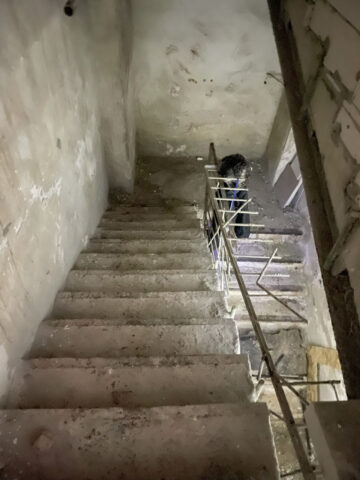
Days start early and end late for Greco. On any given day, Greco might finish laying the foundation of a house or end the painstaking work of weaving camouflage netting to go back to his apartment, where he logs onto Zoom to teach Antioch students in the MA in Nonprofit Management classes like “Financial Analysis for Nonprofits.” Our ability as humans to adapt never ceases to surprise Greco—the idea that he can provide humanitarian relief to a country in a different continent than the one he teaches in may have been possible but would not have been normalized in a pre-COVID-19 world. Greco deeply enjoys balancing teaching nonprofit management with the practical experiences of humanitarian aid in Ukraine. Greco feels that these experiences complicate (in a good way) the already complex nature of building communities, like volunteer groups and nonprofit organizations, which emerge out of circumstances where peoples’ basic needs are not being met.
David Greco’s professional journey reflects a dynamic blend of quantitative analysis, fundraising expertise, and a transformative shift toward strategic approaches to revenue generation in social and nonprofit sectors. There is an extensive list of nonprofits where he has served as director, vice president, and CEO. Greco is currently an Antioch University faculty member, the President & CEO of Social Sector Partners, and the author of Think Money First! Ending the Culture of Scarcity and Achieving Real Outcomes.
Humanitarian Aid In Ukraine
Greco first visited Ukraine back in 2012. He was meeting a friend who worked for a big international relief agency, and they thought that riding the coattails of the Euro Cup, one of Europe’s largest soccer tournaments, would ensure a cheap trip, and it did. Traveling through cities and towns, Greco developed a strong affinity for the Ukrainian people. As he says, “It was one of those trips that just really kind of stuck with me forever.”
When Russia invaded Ukraine in February 2022, Greco couldn’t ignore the call to action. His previous experiences in Ukraine galvanized him to take action, pitching in with his own unique skill set.
Since relocating to Ukraine, Greco has worked on a wide range of projects, from rebuilding homes and schools to contributing to kitchens that provide meals to first responders, medics, and frontline troops. Volunteering has taken him across different regions of Ukraine, including Kyiv, Kharkiv, and Kherson, an area that faced severe flooding after the Kherson dam was breached in June of 2023.
In his own words, Greco describes the nature of the work as “all hands on deck,” where volunteers come together to address whatever needs are most pressing on any given day. “It’s just this beautiful kind of collaboration of people from all over the world,” he explains. Working with many different people on endlessly different projects leads to an ebb and flow of time, and it staves of exhaustion. More recently, Greco has had to self-enforce taking at least one day off a week to do his laundry and tend to his own needs.
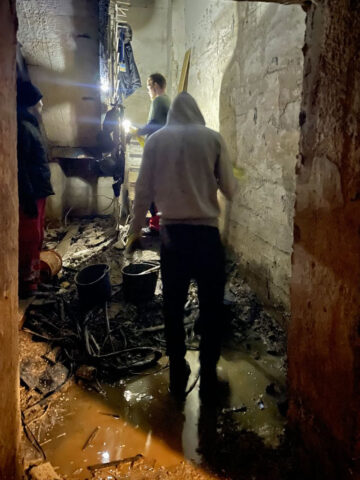
Hands-on humanitarian work gives dimension to the theoretical question that had come to shape Greco’s professional life in the United States. There is a material difference between clearing detritus from a shelling site and contemplating how to interrupt cycles of intergenerational poverty from an office. For now, Greco enjoys this human experience of how people come together amidst catastrophe.
Though work is often long and arduous, the abundance of warmth, appreciation, and gratitude from Ukrainians is more than ameliorating. “It really does restore a lot of my faith that people at their real core are good. People want to do good work, and they want to do good things,” says Greco. The reciprocal relationship, where volunteers worldwide collaborate with locals, creates a unique sense of unity and shared purpose.
Since arriving in May, Greco has mainly worked on physically demanding projects but has also witnessed a flourishing of grassroots volunteer organizations and nonprofits, which are tailoring their services to the need-based particularities of each circumstance. Given Greco’s years of nonprofit management work, it is unsurprising that he has begun helping on the advisory side of a few nonprofits. Most recently, Greco joined the advisory board of a nonprofit that works to de-mine agricultural fields, which is of timely importance given that it directly impacts internal food supplies.
Through it all, Greco is reminded of the ephemerality of life and how quickly civilians are the ones who suffer and are most directly impacted by the broader geopolitical issues. As Greco says, “It’s the civilians who have to find a way to rebuild, and go on, and, you know, recover and move forward. These people are trying to rebuild their lives. If these people can be this resilient, and all these other people come to volunteer, you see the possibilities of what can happen when the social sector, the voluntary sector, the nonprofit sector is allowed to grow unfettered.”
For the most part, aid within grassroots organizations is effectively distributed where needed. Funding that moves through grassroots organizations is not as likely to get tied up in the rigid structures of nonprofit financial management, a phenomenon that has become a defining, and in Greco’s opinion, limiting factor to nonprofits operating within the United States.
Venturing Through The World of Nonprofits
Throughout his childhood, Greco’s family was quiet about their extensive tradition of military service, despite having family members who had served in World War I, World War II, the Korean War, Vietnam, as well as contemporary conflicts, with each generation contributing to different branches of the military. Greco never felt forced to enroll. But eventually he decided to join in this generational commitment to service, and he joined the Air Force.
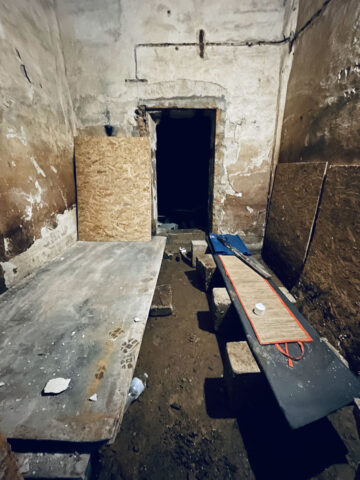
Looking back today, he says that he enlisted in part because his family had benefitted from government-funded social services that helped his family out of poverty. Greco remembers the way these social welfare programs helped his family in the years before they were slashed during the Reagan administration. His formative years were shaped by the presence of federally subsidized initiatives—job training programs, meal programs, school lunch programs, and medical support. Greco explains, “These governmental run programs were what allowed my family to move up that ladder of economic opportunity, which allowed me to become the first in my family to go on to university, and which enabled me to serve in the military, and to have an incredible career in the philanthropic sector.”
Reflecting on the suite of mechanisms that fostered social and economic mobility, Greco says, “Those mechanisms have undergone intentional and systematic dismantling, disenfranchising an entire generation of Americans.” For Greco, much of his life’s work centers on rebuilding access to essential resources. He underscores the significance of providing people with access, recognizing that some individuals require more support than others to navigate and overcome barriers.
After transitioning out of military service and acquiring robust quantitative analytical skills during graduate school, Greco initially envisioned becoming a campaign manager in political campaigns. However, the 2001 recession and an unexpected job opportunity led him into the nonprofit world, where he began noticing disconnects between mission statements and financial management. It became apparent to Greco that money not only sustains an organization’s mission but also ensures mission longevity. The longevity of a service within a given community works towards creating systemic change. “Prayer and hope isn’t a budget,” says Greco, “and too often that is the ethos that drives decision-making within nonprofits.”
Having learned on the job the value of financial skills, Greco’s focus is to demystify finance for nonprofit professionals. To this day, he passionately advocates for equipping decision-makers with financial literacy, emphasizing that finance is about making informed choices based on measured data.
Decades of experience using hard analytics to create revenue-generating initiatives brought to the fore the systemic management issues that make it difficult for nonprofits to stay in the black. On the one hand, Greco notes donors want to micromanage their donations. On the other hand, nonprofits try to undercut the true price of what their services cost, but as Greco points out, they aren’t really cutting costs—employees are eating those costs, which is why the nonprofit trope of underpaid, overworked employees exists.
“Despite the name, nonprofits need to turn profits,” Greco explains. Services cost money, staff needs to be paid, and nonprofits run on a unique model where they offer services to customers who cannot afford to pay for these. This is called a market failure within finance. Fundraising is a means to subsidize the cost of services, making them accessible to those who need them. But all too often, donations come with rigid constraints whereby donors control how money is spent rather than allowing the experts within the organization to allocate funding based on internal and external needs, which are always in flux. Greco explains how the lack of trust within philanthropy—most obviously exhibited by donors controlling how money is spent—cannot be separated from gender and racial biases and prejudices. Put bluntly, the people giving the money are often white men, and the people receiving the money are often people of diverse gender and racial identities.
A New Model for Nonprofits
By 2019, Greco had worked with over 500 nonprofits and felt he was only chipping away at a monolithic block defined by toxic practices. As a longstanding resident of the Bay Area, Greco witnessed the Silicon Valley boom and the burgeoning ecosystem of startups. Why not use the startup model for nonprofits, Greco thought? Why not give nonprofits unstructured multiple-cycle funding? Why not work towards a status quo where nonprofits receive capacity-building guidance just as startups do?
Greco was eager to move away from rigid philanthropic one-time donations and toward adaptive, trust-based philanthropy. In a rapidly changing world, Greco felt rigid models of philanthropy were outdated—ten-year plans are predicated on the notion that in ten years, the world might resemble the world as it is today. Greco refers to this as the myth of normalcy and adamantly rejects it, favoring instead adaptability. “Every year brings its own set of challenges and transformations,” he explains. “Nonprofits need to have the financial flexibility to adapt because their alternative is to die.”
He joined the nonprofit All Stars Helping Kids as the Executive Director in 2019 with the idea of structuring it financially along the lines of a startup. All Stars Helping Kids is a nonprofit run out of the Bay Area that uses a performance-based approach to disrupt generational cycles of poverty. Greco was excited but not too surprised when All Stars Helping Kids grew 70% over a year, whereas the average growth for nonprofits of similar size was 7%.
What was so different about All Stars Helping Kids was not only that they received multiple cycles of funding and the nonprofit knew the cost of its services, but the funding was trust-based. Rather than the hawkish tracking of how and where funding was spent, social impact became the main guiding metric. Greco feels that when donors find a cause that speaks to them, the common ground between donor and nonprofit should be the goal—be it reducing rates of recidivism, employing unhoused folks, or increasing literacy rates amongst youth—and trust that the nonprofit knows best when and where to spend to achieve the agreed upon change. Grecco stepped down from his role as Executive Director in May 2023 when he went to Ukraine.
Greco has taught at Pepperdine, the University of San Francisco, and is now at Antioch University. He often tells his students, “Achieving the social change we want to achieve is expensive, and it’s hard work. If it were cheap and easy, the for-profit companies would have been here making money, right?”
For Greco, it is invaluable that students challenge the apologist attitude deeply entrenched in the nonprofit sector, especially when it comes to asking for money. The nonprofit sector adds value to society by generating access to services where there are needs. Greco feels this should not only be a source of pride amongst nonprofit workers but grounds upon which they see themselves as partners to donors. After all, money is only a part of the equation in effecting change. “A donor could go and give a bundle of money to a kid that can’t read,” Greco tells his students. “That is not going to teach the kid to read. You are an equal partner. You are producing value.”
David Greco posts regular updates about his work in Ukraine on Instagram, where his handle is @el_greco_66. He teaches in Antioch’s Graduate Management programs, particularly the MA in Nonprofit Management.

